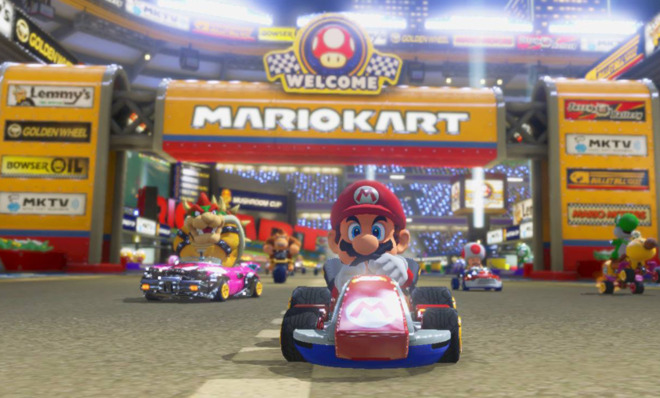What Mario Kart taught me about economics
The classic video game contains important lessons for policymakers

A free daily email with the biggest news stories of the day – and the best features from TheWeek.com
You are now subscribed
Your newsletter sign-up was successful
The release of Mario Kart 8 for the Wii U last month was evidence that this hallowed videogame franchise, which began in 1992 with the release of Super Mario Kart, is as strong as ever. But as I played the latest iteration, I realized there was something deeper to its unique appeal, which stems from a combination of incentives and insights that can actually tell us a lot about economics.
I am certainly not alone in my admiration. The series has now sold over 100 million copies worldwide, making it one of the best-selling video game franchises in history.
The first Mario Kart game I ever owned was Mario Kart 64 for the Nintendo 64 in 1997, when I was 10 years old. It was a pretty easy game to get into — the controls were simple and responsive, the courses were colorful and lucid, and winning races against the computer came easily.
The Week
Escape your echo chamber. Get the facts behind the news, plus analysis from multiple perspectives.

Sign up for The Week's Free Newsletters
From our morning news briefing to a weekly Good News Newsletter, get the best of The Week delivered directly to your inbox.
From our morning news briefing to a weekly Good News Newsletter, get the best of The Week delivered directly to your inbox.
But there was a good deal of complexity to the gameplay. It was easy to pick up, but hard to master — a winning formula for video games down the years from Space Invaders and Super Mario Bros., to contemporary casual gaming hits like Flappy Bird and Angry Birds. Competing against other humans — the game supported a four-player split screen — was challenging, and winning took skill and practice.
One of Mario Kart's hallmark features is the items system. Racers can use a selection of objects to help them win: green shells that can be aimed like projectiles at other racers; red shells that act similarly, except they have homing capabilities; banana skins that send racers skidding; power stars that make the user faster and temporarily invincible; ghosts that render a player invisible and steal another player's item; lightning bolts that make your competitors slow and tiny; and the dreaded unblockable blue shell that homes in on the race leader, knocking him over.
But rather than spelling utter chaos, the game balances its distribution of items so that players who are behind in the race are more likely to be given stronger items. Compared to more technical and realistic racing games like Microsoft's Forza Motorsport series and Sony's Gran Turismo series, where one mistake can spell doom, Mario Kart is much more approachable for newer players. While the most skillful players still tend to win most of the time, the distribution of items acts as a kind of handicap that keeps races competitive and exciting. It's a delicate balancing act between leveling the playing field and rewarding skill and practice — and Mario Kart pulls it off.
With income inequality rising to its highest level in decades, and the proportion of Americans born poor staying poor rising to 70 percent, I think economic policy-makers could learn a few lessons from Mario Kart's system for making sure the race is both rewarding and fair.
A free daily email with the biggest news stories of the day – and the best features from TheWeek.com
First, keep things simple. This is Mario Kart's great attraction. Governments should keep tax, welfare, legal, and regulatory codes as basic and easy-to-understand as possible. That would save millions of hours of time for individuals and businesses, two groups that would rather concentrate on more important things than wading through layers of bureaucracy and obscure laws and regulations.
And second, redistribute enough wealth to keep the race competitive. The political reality is that millennials — the generation that grew up playing games like Mario Kart — are much more comfortable with economic redistribution than older generations. In 2010, Pew found that two-thirds of millennials favored a larger government with more services over a cheaper one with fewer services, 25 points more than the rest of the population.
And while large majorities of older and middle-aged Americans favored repealing the Affordable Care Act in late 2012, millennials favored expanding it, by 17 points. Millennials are also significantly more supportive of labor unions than the population at large.
As a group, millennials don't want to live in a race where people starting at the front or back tend to stay there. That kind of race is bound to foster disillusionment and resentment. They would rather live in a race like Mario Kart, where everyone has a shot at getting to the front — minus the turtle shells, of course.
John Aziz is the economics and business correspondent at TheWeek.com. He is also an associate editor at Pieria.co.uk. Previously his work has appeared on Business Insider, Zero Hedge, and Noahpinion.
-
 The Gallivant: style and charm steps from Camber Sands
The Gallivant: style and charm steps from Camber SandsThe Week Recommends Nestled behind the dunes, this luxury hotel is a great place to hunker down and get cosy
-
 The President’s Cake: ‘sweet tragedy’ about a little girl on a baking mission in Iraq
The President’s Cake: ‘sweet tragedy’ about a little girl on a baking mission in IraqThe Week Recommends Charming debut from Hasan Hadi is filled with ‘vivid characters’
-
 Kia EV4: a ‘terrifically comfy’ electric car
Kia EV4: a ‘terrifically comfy’ electric carThe Week Recommends The family-friendly vehicle has ‘plush seats’ and generous space